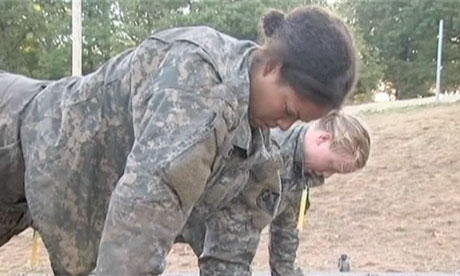
The news has been full of stories about the self-acknowledged "big problem" of sexual assault in the military. It isn't new information, though the amount of public attention being paid to it is. As a result, I've been asked frequently if I would let my daughter enlist when she's old enough.
My answer may surprise you: definitely.
Whether I would "let" my daughter enlist is not even the right question: once she is 18, she has the right to join the military – and as strong willed as she is already (she's not quite two), any resistance from my part would be as likely to encourage her to sign right up as it would be to deter her.
And there are a surprising number of benefits specifically for women about military service. I've written about how my time in the army taught me a number of skills that have since helped me succeed in the civilian world, including how to present myself effectively; control my emotions; prioritize, plan and be decisive; keep perspective; and recognize my own strength.
There are also ways in which the military is surprisingly progressive for being such a conservative institution. It's one of the few large employers that provides subsidized child care. Where I live, the highest rate at the closest military child development center is half what I pay in a civilian facility, and rates are lower for the lowest-paid military personnel.
In addition, while there is a wage gap between men and women in the civilian world, it simply does not exist within the military. Pay is based on time in grade and time in service – no one has to negotiate for raises (a fraught proposition for women).
Contrary to popular belief, the total compensation package in the military is also remarkably high compared to those in the civilian sector, particularly for enlisted personnel – there aren't many other jobs in the US where someone with only a high school diploma can get free health insurance for their entire family from day one. The education benefits alone are incredibly valuable – the post-9/11 GI Bill covers in-state tuition at public schools while providing a housing stipend for full time students who attend classes, an incredibly valuable incentive for those seeking to improve their socioeconomic statuses in an era of rapidly increasing tuition.
I am certainly not arguing that the military is a haven for women. The ban on women serving in combat arms jobs and units has only recently been lifted – though we've been dying in combat since the American Revolution – and the full implementation details are as yet undetermined. We face sexual harassment, assault, and denigration. The military has a long way to go in improving the cultural climate that has allowed these problems to become so entrenched; hopefully now that even the president is publicly calling for consequences, we will finally see progress.
If it doesn't act soon, Congress may take matters out of military hands: there are now calls to create an independent office within the Department of Defense to handle sexual assault cases, require that service members convicted of sexual assault be discharged from the military, and eliminate commanders' ability to reverse convictions for sexual assault.
The US military is out front on wage equality and providing benefits that support families – policies that should be expanded throughout America. It has the opportunity now to lead the way in reforming how it approaches sexual misconduct, which is rife on college campuses and beyond.
Senior leaders should lead the way in changing a culture of victim blaming, vigorously prosecute offenders, and include how officers handle allegations of sexual harassment and assault in their formal evaluations. If it is able to become as progressive on this issue as it already is in others, it will be an organization that I would not only "let", but actively encourage, my daughter to join.

